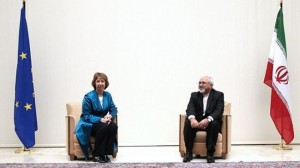 Iran hints at a long-run settlement to the nuclear impasse. But can the six other states at the Geneva talks respond?
Iran hints at a long-run settlement to the nuclear impasse. But can the six other states at the Geneva talks respond?The first round talks on the Iranian nuclear programme involving the new Tehran government are heading towards a conclusion. After a morning of bilateral meetings and calls to capitals to check positions, the Iranian delegation went back into the chamber at Geneva's Palais des Nations with diplomats from six nations to resume discussion on�Iran's plans for dealing with the decade-old nuclear deadlock.
At the end of the day, the Iranian foreign minister, Mohammad Javad Zarif, and the EU foreign policy chief, Catherine Ashton (who acts as convenor for the six-nation group) are expected to issue a joint statement - itself a rare event at such meetings - and presumably announce plans for a follow-up session in a week or two.
The big question now is whether the six nations (US, UK, France, Germany, Russia and China) are able to put together a coherent response to Iran's proposed road-map for navigating away out of the chronic, deepening nuclear crisis.
The map was laid out in vague terms in a PowerPoint presentation given by Zarif yesterday. Its contents have been tightly held but Zarif deputy, Abbas Araqchi, has spelt out some important details. He said it envisages an initial confidence-building deal within six months. This would involve unspecified limits on Iran's uranium enrichment in return for some sanctions relief.
Then there would be a second phase, in which the trust between the parties would somehow be further consolidated. It is not at all clear how, but it would lead to the third stage, a new equilibrium in relations between Iran and the rest of the world, in which Iran continues to enrich uranium under agreed limits but without sanctions.
Araqchi named one of those limits. In the third phase, Iran would agree to a regime of more intrusive inspections by the world's nuclear watchdog, the International Atomic Energy Agency (IAEA). The acceptance of what is known as the "Additional Protocol" is essential for an enduring solution, as it gives inspectors the right in principle to visit to any site it believes could be involved in nuclear activities - not just those declared by Iran, as is presently the case. The protocol is necessary for other countries to feel relatively sure that Iran is not cheating.
In�confirming this offer�Araqchi has gone a long way to break the paralysis that gripped previous rounds of negotiations, in which no party would show its cards first.
Iran is taking this step because it wants the other side to respond by framing an end state to the negotiation process. Tehran does not trust the US and its allies sufficiently to embark on piecemeal confidence-building measures without some assurance of where that process will take it.
Iran wants guarantees that if it limits uranium enrichment the international sanctions regime will be lifted and that its status as a nation with a complete nuclear cycle is acknowledged.
The�Obama administration�is edging towards this. When asked about it, the US negotiator here, a senior administration official simply referred to President Obama's stated pledge that Iran has a right to a peaceful nuclear programme for power generation.
That is pretty close to a 'yes'. It is not clear enough for Iran, but the administration is constrained by Congress which earlier this year restated its insistence that the lifting of sanctions was dependent on a complete halt to enrichment.
Meanwhile, Zarif and President Rouhani are also limited by a ruling by Iran's parliament that the IAEA Additional Protocol is unacceptable. Hence the idea of a first phase, which builds trust and convinces hardliners in both camps to relax their grip on policy.
Iran has already signalled that it can stop producing medium-enriched (20%) uranium as part of a first phase. In return, the US and EU can relax some sanctions without recourse to Congress. Jeffrey Goldberg at Bloomberg quotes�senior administration officials as saying�that Sherman's delegation could unfreeze some of the $50 billion in Iranian assets blocked around the world.
Rouhani desperately needs this money to maintain the momentum of reforms at home and demonstrate he has the solution for Iran's severe economic problems. Obama really needs a success in the Middle East for a foreign policy legacy. So an initial deal ending the production of 20% uranium is possible.
The most difficult part will be getting from such a deal to Tehran's third phase. There are some major obstacles. The West does not want the heavy water reactor in Arak turned on, because it would start producing plutonium and then be immune to air strikes, as bombing would send up a radioactive plume. According�to one version of the Iran plan�at least, Tehran insists Arak goes ahead.
Then there is the underground enrichment plant at Fordow. The West wants it closed, but for Tehran a bomb-proof facility is essential insurance against things going sour.
There are fudge solutions to such problems. Work on the Arak site can continue to experience 'technical problems'. Enrichment can be suspended at Fordow but the equipment kept in working order. But these short-term fixes will eventually have to give way to long-term solutions that would involve painful concessions.
The first phase on the table in Geneva is intended to create enough mutual trust to make such concessions feasible. But more immediately, it is meant to take the threat of yet another war in the Middle East off the table.
By Guardian�
The Iran Project is not responsible for the content of quoted articles.










